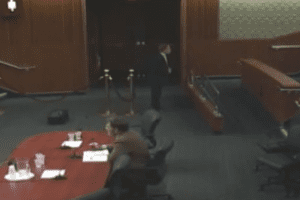
Protesters Against New York Fracking Show Force During EPA Hearing. Both sides of the hydraulic fracturing debate made their feelings known during two public hearings the Environmental Protection Agency (EPA) convened yesterday in Binghamton, New York. Hundreds of protestors, both for and against the gas drilling process, carried signs and shouted slogans outside the Binghamton’s Forum […]

Protesters Against New York Fracking Show Force During EPA Hearing. Both sides of the hydraulic fracturing debate made their feelings known during two public hearings the Environmental Protection Agency (EPA) convened yesterday in Binghamton, New York. Hundreds of protestors, both for and against the gas drilling process, carried signs and shouted slogans outside the Binghamton’s Forum Theater.
Inside, attendees debated just how broadly the EPA should construct a hydraulic fracturing study it announced this past March. The New York meetings are the last of several the EPA has held in preparation for that study. Two more sessions are scheduled for Binghamton on Wednesday.
Hydraulic fracking, also called fracking, involves injecting water, sand, and a cocktail of chemicals at high pressure into rock formations thousands of feet below the surface to force out natural gas, could contaminate vital water supplies. Some attendees expressed concerns that those chemicals could contaminate vital water supplies.
“There are numerous reports of water contamination related to hydraulic fracturing in states across the country,” Rep. Maurice Hinchey, D-N.Y said during the event. “Despite the fact that EPA is, in many ways, precluded from taking regulatory action in response to these reports, I believe EPA must investigate to understand what is being done — to keep water supplies safe and secure.”
According to the Associated Press, Hinchey is one of the authors of the so-called FRAC Act in Congress, which would put fracking under EPA regulation.
Opponents of fracking want the EPA’s study to take a comprehensive look at the entire fracking process. Industry, however, is seeking to convince the EPA to focus only on the impact fracking has on water quality. Yesterday, fracking proponents pointed to the jobs and revenue that could potentially come from gas drilling, and insisted that hydraulic fracturing hasn’t been definitively linked to any instances of water contamination.
“Billions of dollars in economic impact on New York and its citizens is at stake here,” said Brad Gill of the Independent Oil and Gas Association. “The positive impact is staggering but it doesn’t come at the expense of environmental protection.”
In New York, fracking has been particularly controversial. Gas drillers have been eyeing massive deposits in the state’s Marcellus shale region, which includes the entire Catskills watershed that provides New York City with all of its drinking water. People there are worried that drilling could pollute the watershed. At yesterday’s meeting, Paul Rush of New York City’s Department of Environmental Protection pointed two to studies his agency conducted that showed serious risks to the watershed if gas drilling is allowed there
The state’s Department of Environmental Conservation has had gas drilling permit approvals on hold since 2008 while it conducts an environmental review of fracking.
Thanks to a move by Congress in 2005, fracking is exempt from regulation under the Safe Drinking Water Act, so drillers don’t have to disclose what is contained in their fracking fluids. However, some small studies have shown that these fluids contain, among other things, , barium, strontium, benzene, glycol-ethers, toluene, 2-(2-methoxyethoxy) ethanol, and nonylphenols. All have been linked to health disorders when human exposure is too high. It is believed that as much as 90 percent of fracking fluid is left in the ground after drilling.
The personal injury attorneys at Parker Waichman LLP offer free, no-obligation case evaluations. For more information, fill out our online contact form or call 1-800-YOURLAWYER (1-800-968-7529).


